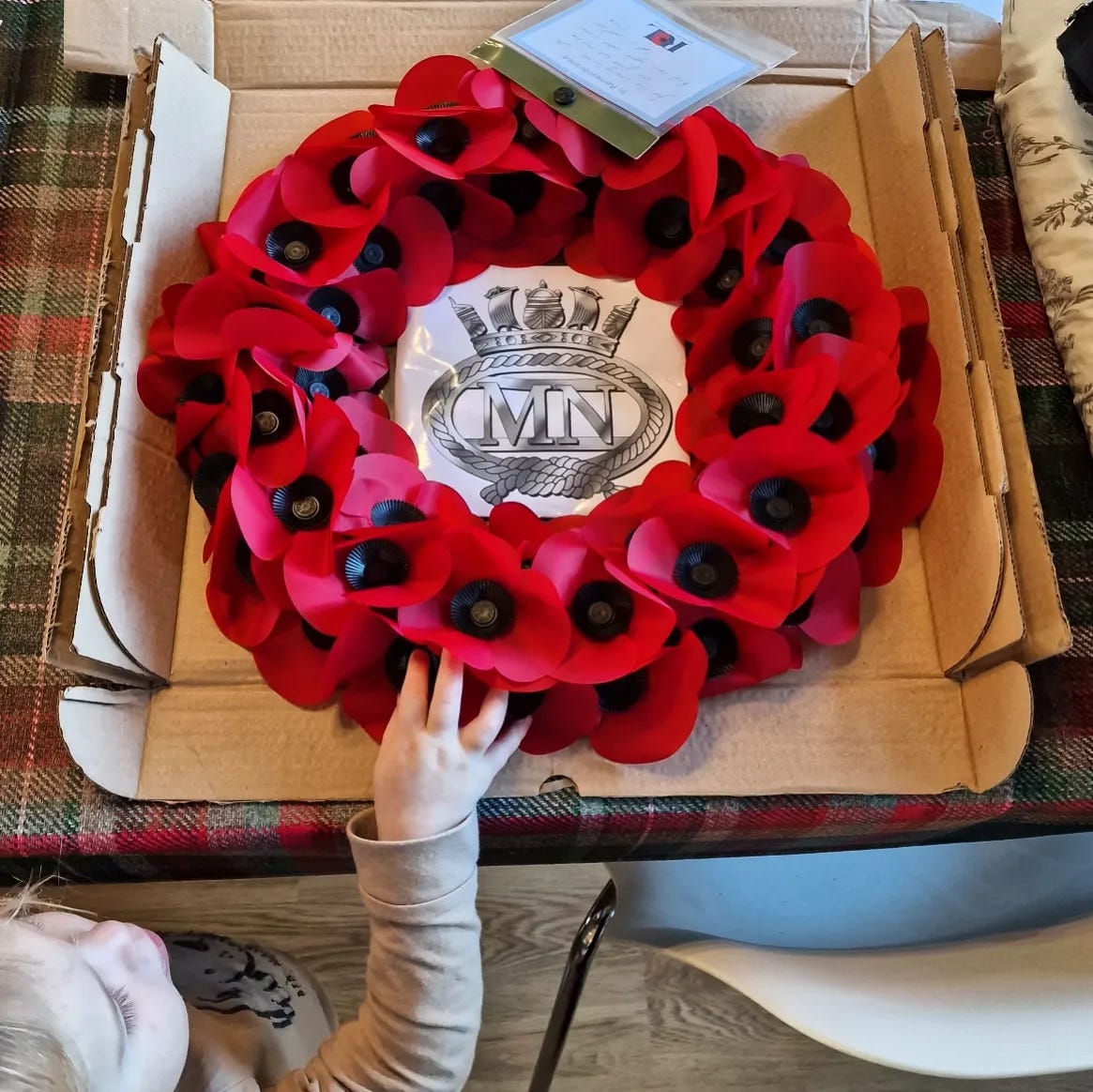
Remembrance Sunday is a tough one for me. I’m no fan of the modern concept of the Nation-State. As one who enjoys the freedom of the seas, I know how artificial national boundaries can be. The historic three-nautical mile limit offshore was conceived as belonging to the state, on the logic that the range of canon fire denoted the reach of their influence. The only countries I’ve ever been to with a ‘hard’ border at sea are the US and Israel, who make a point of coming out and showing you that they have guns, and they will point them at you.
All State boundaries are defined by the capacity for violence. That violence is often directed inwards, as well as outwards. The spear is sharpened at both ends.
I’ve grown up in the age of boycotts, buycotts, sanctions and cancellations. The postmodern neo-Marxism I was taught at school and by my culture. It insists that consistency is a high virtue and that one should hold strong opinions on all matters – whether you know enough about them or not – and that you should never waiver from those opinions. Unless the mob disagrees with them. In which case, immediately get woke, reverse yourself, delete the tweets, and do not speak to those who disagree with the consensus. Shun them, delete them, and do not stand too close to them, in case of ideological contamination.
(Remember, loose tweets, sink fleets)!
Thanks for reading Captain Yankee Jock! Subscribe for free to receive new posts and support my work.
Therefore, in some of my younger years, I am guilty of having avoided church, politics and ceremonies of State. The seductive idea that I would be a Nietzschean superman of integrity fuelled my avoidance of things associated with the government. They were, after all, sinners and perpetrators.
Now I am a father and a captain. Both of these are roles that carry responsibilities that include doing the right thing, even when no one is looking. So, this year, four days after my aforementioned stint in Germany, I decided that I should take my proper place in society and go to a remembrance day service.
I texted one of the local Church of Scotland elders I’d met at Easter, and asked if they’d mind me turning up in uniform. That was my Royal Navy Reserve training kicking in. No other attire seemed appropriate for a serving Merchant Navy Master, even if I am a second-class one.
I polished my shoes (a bit), cleaned my cap, and I even ironed my shirt and had a shave. Poppy pins and flags. No medals (thankfully). I brought a wreath and wrote to the handful of Merchant sailors whose names are inscribed on our local church monument. It is a landlocked village, a tiny mining and farming community for most of its history, but even their mothers bid them vale. As did the mothers of many a jolly jack tar from Edinburgh, Stornoway, and Portsmouth.
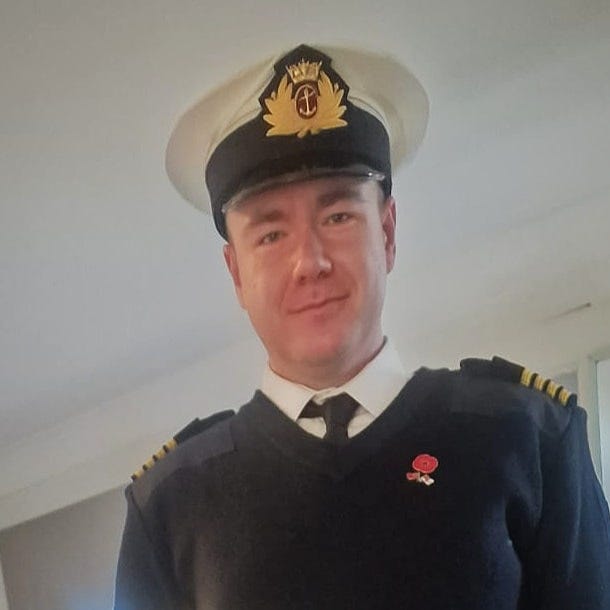
15,000 Merchant Seamen in World War One and 30,000 in World War Two have no grave but the sea.
Those were different days. When Britannia ruled the waves, our country was an industrial innovator. Before WW1 there were no passports and no income tax bands. There had been 100 years of peace in Europe. We were an Empire that bore the responsible role of the leader of Christendom.
Now, all we have is a senile old colonist puppet, occupying the rank of ‘leader of the free world’. Whatever that means when you simultaneously fund CCP gain of function research, fund online censorship, enact communist lockdowns, retain vax-passes, propagandise your own people, and stuff your bank account with Burisma bucks!?
The American colonial project since Vietnam has been more dishonest than the British one. They played the cry-bully ‘victim of colonialism card’ in the revolutionary war narrative far too hard. Perhaps that’s partly why the ‘1619-project’ pendulum has now swung so hard in the opposite direction.
In any case, I think almost every male of the species grows up with at least a passing fascination with combat. Surely, on at least one occasion during their childhood. It only takes a whisper of historical knowledge to understand that if all the men were once ‘called up’, then that might happen again to you. So you might pay attention to warfare and politics at least a little bit, eh, boy?
War is a fact of history, and of life. You need to do nothing but be yourself and harm nobody, and you will still have enemies, even for that.
Like many male children of divorced parents, I scanned the landscape of my childhood for male role models at all times and modelled myself on the traits I saw. Fortunately, I preferred the Sherlock Holmes-style ingenuity of Adam West’s Batman and the Hornblower-Esque bravery of Captain Kirk Star Trek more appealing than the mindless violence of the 1980s action heroes.
And then there was the enemy. Always, in popular culture before 9/11, the Germans or the Nazis.
I once read that Britain has produced more literature about World War two than any other nation on earth. Possibly of all nations combined. And it is easy to see why. It isn’t too hard to portray the British as the good guys, and the Germans as the baddies, from our ‘victorious’ position.
Authors and broadcasters have for decades detailed the atrocities of the Nazi war machine, the evils of the final solution, and recounted many fine tales of dastardly German underhandedness overcome by plucky British underdogs and Bletchley Park Boffins. My mother owned a fifty-volume encyclopaedia on WW2, which I believe was the precursor to the World at War television series. I studied it for years. Battle plans, accounts, technology, chronologies, uniforms, rank, maps.
I was never an expert, but I always had a fascination with the feeling that one day I might also be called to face such an adverse foe as the German SS.
When I turned about 10 years old I was gifted a television for my room. It was a large cathode ray tube, with a stainless steel knob that you had to rotate to tune in to a frequency, while you jiggled the wire aerial around for a better signal. I would listen with the volume just one up from zero, so even after lights out at bedtime, I could watch whatever I wanted. Usually, that was BBC Horizon documentaries (before they became dumb political broadcasts), history documentaries, and war movies.
I watched one documentary that interviewed German WW2 veterans. It was the first time I had ever been invited to see a German soldier as a human being or understand history from a foreign point of view.
I paid attention to one former SS trooper who recalled being selected for the SS after demonstrating particular toughness during an obstacle course in the Hitler Youth summer camp. While crawling over rough ground, the skin on his elbows and knees opened up, yet he continued on to complete the course without complaint. His endurance in spite of pain impressed the officers, and so, he made the cut.
That really made an impression on me. Clearly, we British had no monopoly on stiff-upper-lip toughness, as my teachers and society would have had me believe.
How tough would I have to be to face an enemy like that? Smart people, who place a high value on tolerance for pain, endurance and strength?
Later I joined the Army Cadets, the Royal Navy Reserve and the Merchant Navy. Throughout those formative years, that sentiment stayed with me, and in the Army Cadets, I too enjoyed playing tough, like that boy in the Hitler Youth.
A Filipino Bosun on a ship once told me how much the Filipino deck crew respected me because several times they had seen me wear through my blisters at work, or cut through my skin and bleed, but just continue working. They liked that because they valued that kind of fortitude as well.
Even last week when I was tiling, I cut a couple of my fingers. I don’t even think about it. Even though now my iPad and cellphone fingerprint scanner won’t work, because I’ve shredded my fingerprints. (Another reason why the chaps at Silly Con Valley aren’t as smart as they think they are, and the cult of Baal will never win. It’s nothing some Luddites couldn’t fix in a few hours with a lump hammer and a box of matches).
I think I heard it was Joseph Goebbels, the Nazi propaganda minister, who claimed that the reason the British were winning the war was because of their superior propaganda. He succeeded Hitler for a day before committing suicide, so he never stood trial at Nuremberg. but if that was him, I think he made a good point.
He wasn’t simply referring to the state monopoly broadcaster, the BBC (British Brainwashing Corporation). I think he meant the entirety of our culture, including our ceremonials, aristocracy and monarchy. And I think he was right.
The only problem is that after the war, while the Reich’s Propaganda Minister grew cold and stiff in that bunker, the BBC grew in scope and sophistication. Therefore, his adage that “the press [is] a great keyboard on which the government can play” continued to manifest long after his death on this side of the North Sea. As such, they did go down in history as the greatest criminals of all time, while our criminals continued to commit their own crimes. It has taken the internet, and the blatant manipulation of the Covid-19 story, for many people to even begin to comprehend that our own media are playing the same game as the 1930’s fascists were.
Germany survived the Kaiser and the Nazi party. The West German Economic Miracle (which we should call the GEM), was in many ways, the reward that the German people received for the removal of the German government of the day. The momentum of that brief period of deregulated freedom is what built Deutsche bank and sustained the German and EU project up – right up until it’s recent spate of fiat and debt-induced crises.
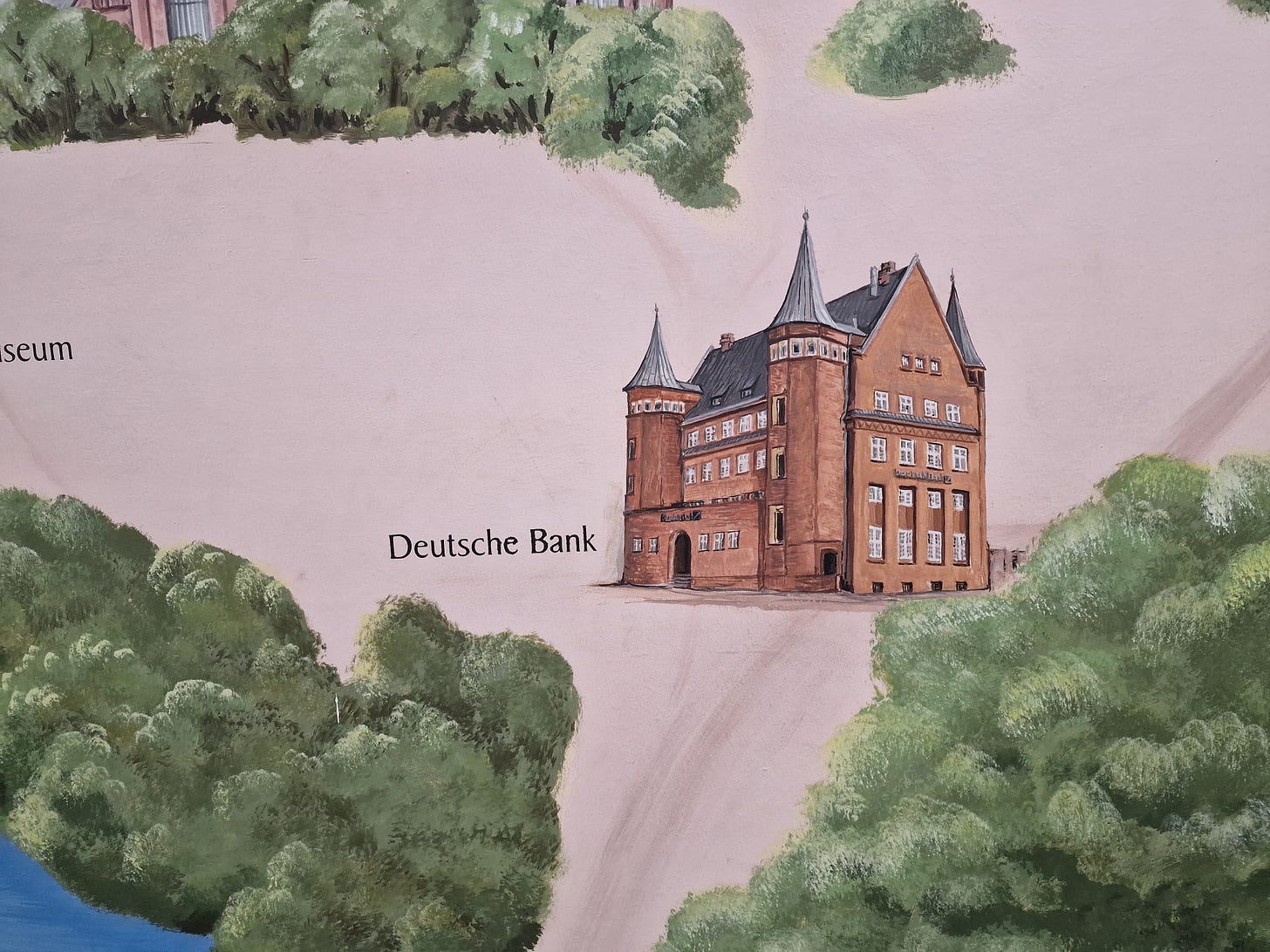
Thank you for reading Captain Yankee Jock. This post is public so feel free to share it.
In fact, it is arguable that the entirety of World War One, World War Two, Communism and the Cold War might have been averted if fiat currency had remained off the table.
The reason so many believed that ‘the war would be over by Christmas’ in July 1914, was not just naïve optimism. It’s because that’s how much ‘warring’ the gold and silver reserves available at the time could sustain. Admittedly, Britain remained on the Gold Standard until the Invergordon Mutiny in 1931, but Germany suspended it, and the Bank of England ignored the gold market signals and artificially fixed the price of gold during the war. This effectively meant that the value of currency ceased to be related to physical reality in 1914, thereby allowing governments to use the power of diktat to remain liquid and prolong the war. The net result, the entirety – to a penny – of the wealth generated by the agricultural and industrial revolutions was spent on dismemberment and destruction.
The British and German currency manipulation forced the hand of the US and also led to the first Federal Income tax when America entered the war. (Please correct me if I’m missing any salient details here – I know you financial boffins could write essays on this time period. Please share. I’m planning to activate Substack chat, so feel free to get in touch).
The industrialised mechanisation of mass slaughter that marked trench warfare and the awful carnage of my forebears in the North Atlantic was funded on both sides, by a fraudulent money supply. The gold exchange rate never restabilised, inflation has reigned ever since, and the ensuing great depression led to the widespread adoption of fiat currency, national debts and boom-bust economics. The magic money tree funded Lenin’s October Revolution and therefore led to communism, the great democide’s of the twentieth century, the nuclear arms race, and the current misery we see in China.
My own country, Scotland, still feels especially betrayed by this policy.
There is a long-standing myth in my country that Scottish people have disproportionately been members of the Special Forces, and/or have contributed a higher percentage of their population as casualties of war over the years. Scottish separatists I’ve met in the Navy had a chip butty on their shoulder over this, but it isn’t literally true. However, the origin of the myth is equally devastating and has had implications that have left my country in ruins and provided fuel to the fire of SNP misgovernance.
I think I may have mentioned before on this Substack/blog that when war was first declared, there was in fact a disproportionate number of volunteers for the military from Scotland. And that first wave were lambs to the slaughter. WW1 was a horrible war, that no nation, general or Admiral was equipped to deal with. Subsequent waves of conscripts, young family men and boys, seized from their homes, children and chosen occupation suffered immeasurably. The sense of injustice over the loss of that first wave of the bravest and best haunts our land.
War is politics, turning men into meat.
For Americans and Australians among my subscribers, you could do worse than to watch ‘Blackadder Goes Forth’. A British tv classic, that captures the bittersweet gallows humour, fatalism, duty and sacrifice of a generation. The final episode would bring a tear to a glass eye. And for those with a nautical bent, watch The Cruel Sea, preferably wearing an itchy wool jumper, with a large Scotch in one hand, and a pink gin in the other, for full transportation back to the time period.
The societal upheaval, and pain of the war and the following depression, led to a mass exodus of the population from Scotland. Many stayed in England where they had forged relationships while in military accommodation, but many more abandoned the country altogether for Australia, New Zealand, Canada, South Africa and the USA. It was a brain drain and a labour force depletion that Scotland never recovered from. It compounded the depression and the great foundries and manufacturers from Clydeside to Bo’ness that had forged the canon for the Crimean war and built the ships that ruled Britannia’s waves, precipitously dwindled.
This period gave rise to Kier Hardie’s labour party, the welfare state, and gave birth to the National Socialist Party of Scotland – the SNP. When Margaret Thatcher cut the welfare state and thumped upon Hayek’s Constitution of Liberty, the remaining Scots saw it as an ungrateful disregard for the sacrifice of Scotland’s war dead.
It was as though the widows and orphans of those two great conflicts had endured their suffering and been given a lifeline in the form of the welfare state, only to have the acknowledgement of their pain rescinded by the Iron Lady herself.
The betrayal compounded in their minds. The term ‘Tory’ has been an epithet ever since, signifying not just a monarchist, but one who supports an old-order that resurrected feudalism for the furious conscription and desolation of our youth.
When Scotland joined the Union in 1707, the size of the population of England and Scotland had been broadly similar for hundreds of years. An even match, and a partnership of equals. Cousinhood, not conquest, brought James the Sixth to the English throne, and Guy Fawkes to his end.
But what of Scotland now?
Our countryside is desolate and empty not just because of the clearances, but the decimation of two generations of young men with the muscle required for crofting and fishing life in our remote glens. Our villages are now too expensive to live in for those who should have homes there as their birthright, as our top-heavy population expires. Instead, people from Manchester and London who bought their council house for £10k in the 80’s, and sold it for a million pounds in the naughties, have driven prices up and changed the culture. And they are fleeing England’s crowded boroughs as their own culture is swallowed up and displaced, and their own property market runs away from them. (SNP rescinded the right to buy in Scotland).
In an age where identity politics and minority coalitions dominate politics, and centralisation has set the agenda, Scotland is no longer an equal shareholder. A further betrayal.
In the increasingly race-based political narrative of our time, it matters that Scotland’s population has only recently recovered to pre-WW1 levels, while England’s has exploded to a multi-ethnic 45 million – roughly 9 times that of Scotland. Our capacity to negotiate within the Union is thereby diminished. And that the future of England’s demographics is Islamic, not Anglican, casts a seemingly impossible plot twist to the story of our national unification as one culture. Since Christ was the only motif that ever held our flag, and our story as a nation, together.
I have not finished grieving for the damage done by World War One. Nor, I think, have the Scottish people. Yet times are moving on too rapidly for such luxuries as grief and mourning. We now live side by side with Kurds, Syrians and Ukrainians, brought to us by the continuous years of warfare and immigration that have not slowed or stopped since a teary-eyed Mr Blair took office.
When I was younger, the islanders barely spoke of the loss of the 205 men on HMY Iolaire. It was the largest loss of life at sea in peacetime, after the Titanic. it was a sadly avoidable tragedy that (seemingly) needlessly wasted the lives of many men who were returning home to the island after surviving the entire four years of the war. A loss that widowed so many, it was said that no family on the island was unaffected. It of course devastated the local economy.
It took until my generation reached their twenties before I heard the disaster spoken about openly, and not in hushed tones of agony or sympathy. It took 100 years before monuments were erected and museums revealed the stories, so raw and heartfelt the loss of those lives still was.
I always highly recommend reading the Lost Voices books by Max Arthur. They are collections of diary entries from soldiers, airmen and seamen from both the World Wars, and the intervening years.
The harrowing and poignant tales with stay with you for the rest of our life, in a way that no other history will.
I re-read some passages the night before Remembrance Sunday. The shocked young seaman who remarked on his Captain’s total absence of emotion when informed that the ship’s Royal Marine Commander had slit his own throat to commit suicide in his cabin. The feelings of a young British officer on attachment to our Russian allies in St Petersburg, as his host nonchalantly executed prisoners guilty of petty misdemeanours, openly, with a pistol in the street. The tragedy of a Welsh (non-uniformed, ex-coal miner) tunneller shot by his own British Sergeant for failure to salute in the trenches. All because the Sergeant was unaware the sappers had been exempted from such formalities.
One diary entry that perfectly summed up the gruesome tragedy of the human condition in war, for me, was that of a soldier who was picked to be part of a firing squad. This being the one and only order that soldiers were permitted to refuse in the British Army, he chose to carry out his orders so that it didn’t fall to one of his friends to carry out the terrible task. That task was executing young boy soldiers who were being shot for ‘desertion’.
Many young lads were ‘white feather’ peer-pressured and propagandised into joining the Army years before their 16th birthday, and the struggling Army was only too keen to take them. But no sympathy was afforded these children when shellshock got the better of them. They were treated as ‘cowards and deserters’, tantamount to traitors.
The diarist noted the tragedy, but admitted, he ‘couldn’t see any other way to convince men to march over the top to their deaths by machine gun fire, than to threaten them with execution for failing to comply’.
I believe the British military was the last member of the security council to recognise PTSD as a medical condition.
So when I attended our quiet, uncomplicated, beautiful little 19th-century Church of Scotland service, I didn’t attend as a naïve patriot or simple sailor. I went with a heavy heart and a complicated emotional burden.
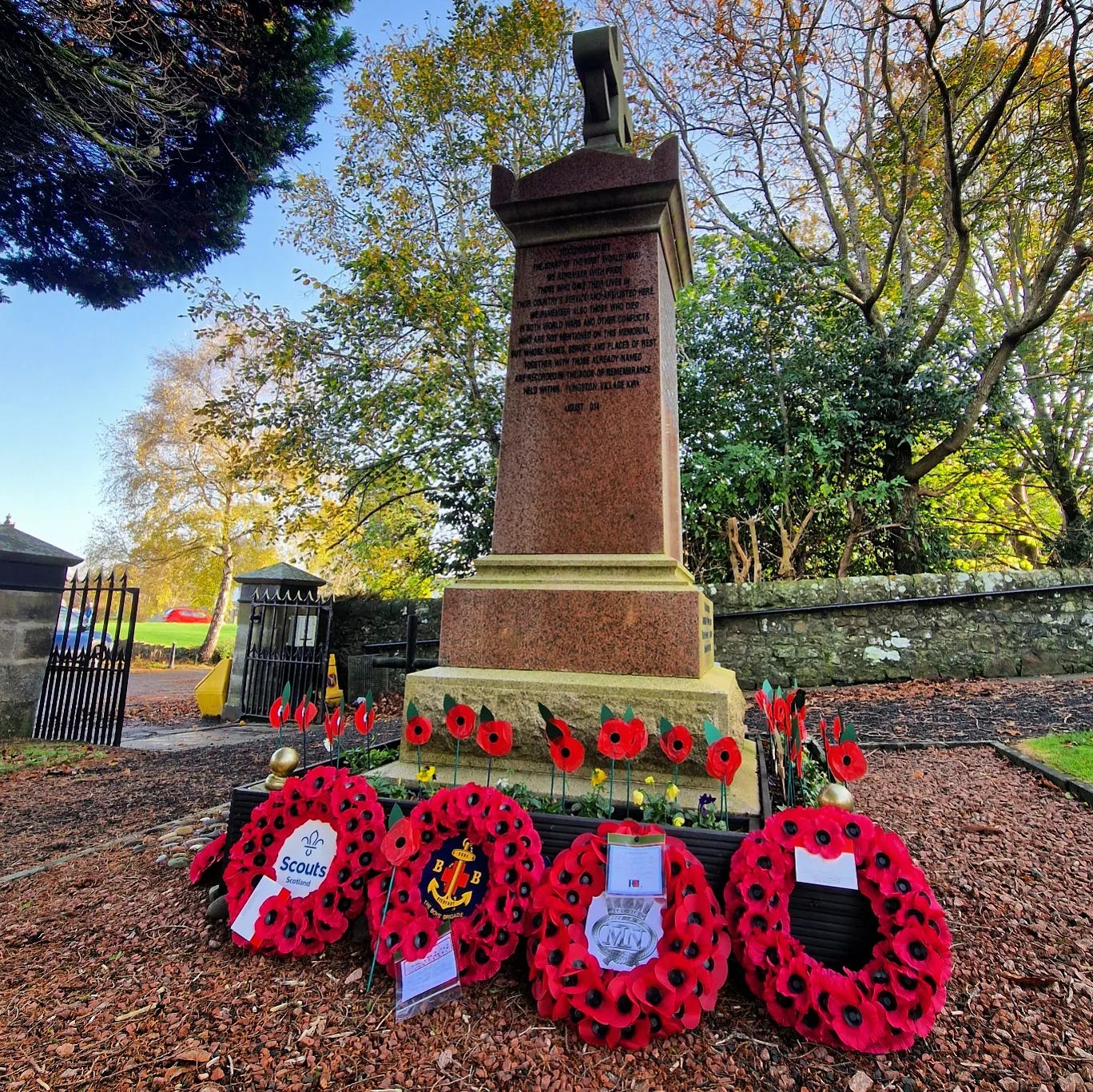
I was raised to believe that their sacrifice was ‘necessary’, or that ‘we’d all be speaking German right now if it wasn’t for x, y, z’.
I’d just come back from three weeks in Germany, where I noted that on a material basis, even the former East Germany seemed to be doing a lot better economically than the Scots are, with our high tax, drug deaths, poor housing stock, alcoholism, and ailing eco-fascist economy.
I don’t think anybody ‘won’ the war. We’re all still paying for it.
And after the evil dance with tyranny that our country engaged in over the last two years, I have no patience for such sentiments as the utilitarians would argue. Since the Branch-Covidians reminded us how heartless these ‘necessary evils’ can be, I don’t believe in anyone who makes such calculations anymore. Whether they’re out to save the NHS or not.
I don’t think being German would be so bad, or so different from being British. They were people like us, betrayed by their own set of politicians and warmongers, just as we were. Their relationship with the state as tortured and complex as our own.
My grandfather fought as a Royal Navy Gunner for the duration of World War 2. He later found out that our Admirals had been meeting and dining with German high command throughout the war, for high-level ‘discussions’. He later only bought German cars, driving BMWs for the rest of his long life, and forbade any of his sons from serving in the British military.
My father recalled one humourous incident when a British Army Sergeant Major called around every house in the village looking to recruit young men, only to be barked at and verbally humiliated by my grandfather. The CSM went off red-faced and defeated after an amateur shouting match, only to come back half an hour later with his tail between his legs, asking to use the toilet.
When I last visited him in the nursing home, and my grandfather realised I was still at sea, he remarked: ‘so you haven’t got that out of your system yet’?
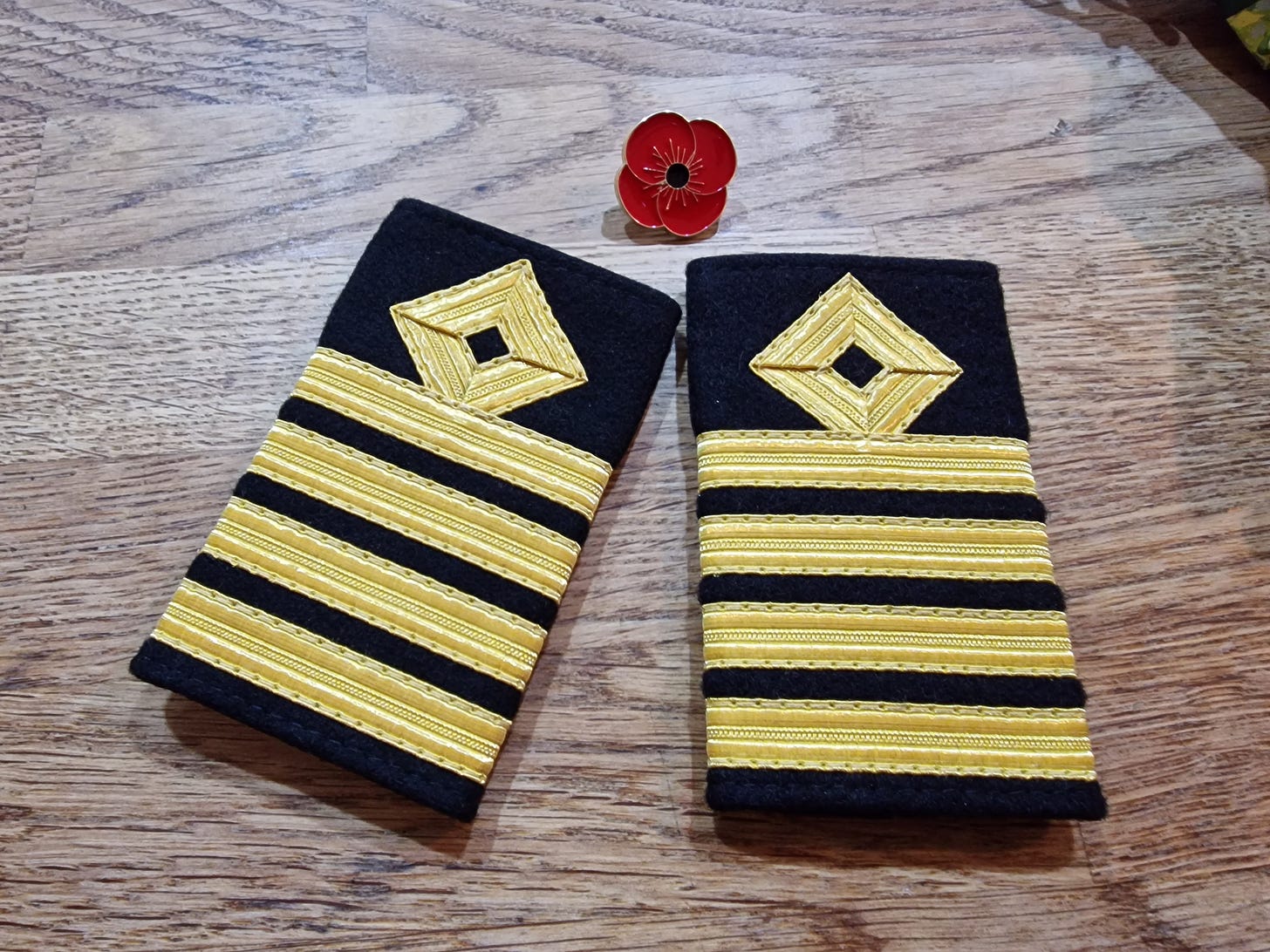
I hadn’t.
I still think the world needs sailors, and will do for a long time yet.
I went to Remembrance Sunday Service because I think we Brits are a seafaring people and that little old Captains like myself have a role to play in our society. We are, after all, an island at the centre of the world.
I did not attend to glorify the state, nor to revel in the victory of war, or the continuation of patriarchy or colonialism, or supremacy.
No.
I went to the service, to remember them. All of them, who were victims of the tyranny of their age.
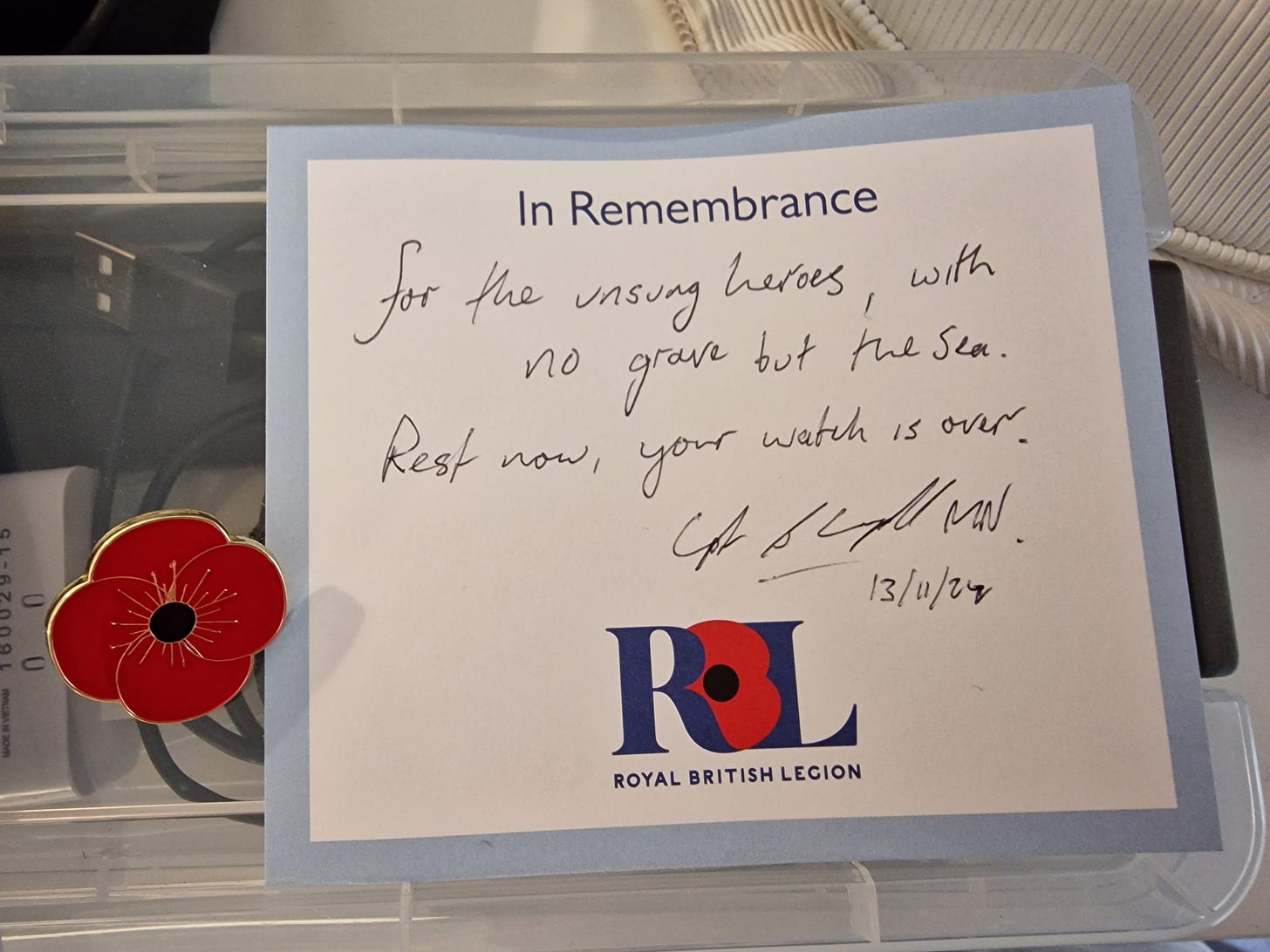
German, British, and every other stripe, creed and colour from across Christendom and beyond, who thought they were fighting the war to end all wars. And to remember the high cost, if we do not weed out the tyranny in our own time.
And while the Sunday school teacher spouted the usual cringe-worth banalities of our time – hate is bad, blah, blah, blah – the minister seemed to agree with my worldview quite closely.
War is in us. All of us. And we’d better watch out for what we call forth into being. And we need to be on guard for those in positions of power, who manipulate us and provoke our senses, and keep us living in fear and paranoia, and away from truth.
‘he hath broken his covenant. The words of his mouth were smoother than butter, but war was in his heart. His words were softer than oil, yet they were drawn swords.’ Psalm 55.
Also, he actually used the word ‘hopium’ in his sermon. Doubtless, a keen Delingpod listener.
